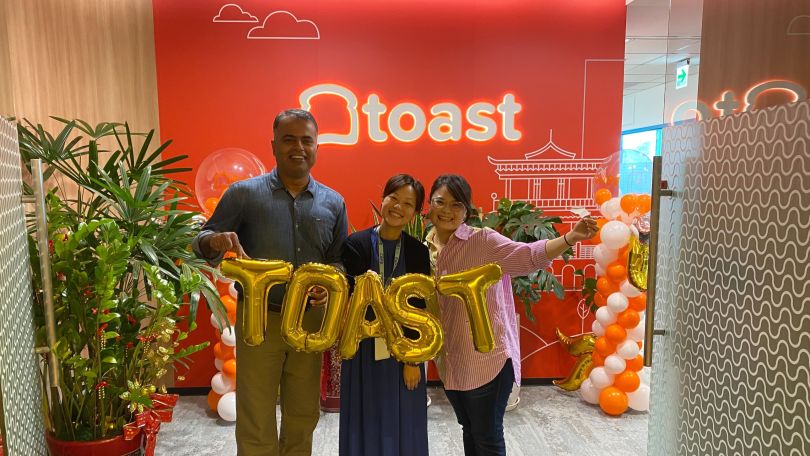There are three plants that keep over half of the world fed: rice, maize and wheat. Those three crops provide over 60 percent of the world’s food energy intake, according to the United Nations.
While all are used in countless recipes, the three are foundations for one of history’s most important food staples — bread. Whether it’s bhakri, tortillas or a baguette, some form of bread is found in nearly every culture.
Which makes Toast an apt name for a global organization.
What Does Toast do?
Toast provides a single platform of SaaS products and financial technology solutions to help restaurants run smoothly. The Toast platform includes a point of sale system, the ability to manage payments, supplier management, ordering, team management and more.
The restaurant SaaS platform has a dozen offices spread across the United States, India, Ireland, Canada, England, Poland and Taiwan. Additionally, Toast has a well-established remote culture, giving employees — known as Toasters — added flexibility in their working styles.
“It can be difficult to maintain a sense of culture when being separated by both location and time zones, so we are very dedicated to keeping our teams connected,” said Sally MacDonnell, senior account executive for Toast. MacDonnell is based in Canada and spends a lot of time building relationships with restaurant owners to drive Toast’s sales pipeline.
“I have a unique and fortunate circumstance as I work and reside in my selling market,” MacDonnell added.
MacDonnell noted that the international sales team — though working in very different markets, with different languages and in vastly different cultural practices around dining — is united by camaraderie and collaboration.
“Despite being so far apart, regular meetings and tight communication has kept us united,” added MacDonnell.
The Time Zone Challenge
It’s well understood at Toast that being on an international team has significant advantages, like built-in diverse perspectives and expertise, but also inherently faces unique challenges. The logistics of working with office locations across six different time zones — in addition to remote employees — can make even basic communication challenging to keep the team updated and working efficiently.
MacDonnell notes that Toast provides tools to help. The company’s internal tech stack plays a big role in clear communication channels and advanced collaboration tools to help the global teams succeed.
“By embracing these strategies, we ensure that our global teams stay connected, productive and aligned,” said MacDonnell. “Being adaptable to change is incredibly important as Toast finds its stride in the international markets.”
“Being adaptable to change is incredibly important as Toast finds its stride in the international markets.”
Ilangeeran Karthikeyan, senior software engineer, leads an engineering team based in Chennai, while his team’s counterparts in product and design are located in the United States.
“Despite the geographic separation, our collaboration remains seamless thanks to a robust suite of communication tools and well-defined processes,” said Karthikeyan. “We leverage video conferencing, project management software and regular sync meetings to ensure clear and continuous communication.”
Karthikeyan uses a mix of synchronous and asynchronous communication to mitigate miscommunication. Making sure to “do the little things” is what he thinks makes all the difference: things like recording meetings so those who can’t make the scheduled time don’t fall behind on a project. He shared that another common practice on his team is hosting regular cross-regional, team-building activities and knowledge-sharing sessions to strengthen the global community on the technical side of Toast.
“Our consistent approach ensures that every team member, regardless of location, has access to the same resources and support, fostering a unified and collaborative work environment,” he added.
Events That Build Camaraderie
To Karthikeyan, cultivating an international culture where everyone feels included requires open communication around new ideas and showing up to the events that build camaraderie.
“At Toast, our international culture is vibrant and inclusive, characterized by regular events that bring together team members from around the world,” he explained. “We host research and development snack talks, town hall meetings and coffee chats with leadership — all of which foster open communication and idea sharing.”
“At Toast, our international culture is vibrant and inclusive, characterized by regular events that bring together team members from around the world.”
Karthikeyan shared an example: Toast’s annual restaurant innovation event, Spark. For employees, the event includes workshops that are meant to give the time and creative bandwidth for cross-functional collaboration and learning.
“These initiatives help us connect with colleagues globally, allowing us to appreciate diverse cultures, cuisines, traditions and customs,” he added. “By celebrating our diversity and promoting cross-cultural communication, we create a unified and dynamic work environment, which makes us the best place to work globally.”
Practical Advice for Working Across Borders
Working with a widespread global team — and global clients — requires some shared practical knowledge. To MacDonnell, a few basics can help.
“First off, get a good grasp of local cultures and business norms — it really pays off in building trust with clients,” noted MacDonnell, adding that collaborating often and through efficient communication tools is “the bread and butter” for an international team.
When it comes to making sales across countries, languages, customs, cultures and borders, MacDonnell notes that a big part of international work comes down to being patient, persistent and adaptable.
“Customize your sales pitch to fit each market’s specific needs,” said MacDonnell. “Stay adaptable and open to learning from market feedback and team insights.”

“For those working in an international setting, my advice is to embrace flexibility, cultural sensitivity, transparency and proactive communication,” said Karthikeyan, noting what tactics he has seen work well. “Understanding and respecting cultural differences is key to building strong relationships with your global colleagues.”
He added that making sure to document decisions and action items can help teams avoid misunderstandings.
“You have to encourage open dialogue and create an environment where team members feel comfortable sharing their ideas and concerns,” said Karthikeyan. “Active listening and empathy go a long way in fostering trust and collaboration. By adopting these practices, we can create a cohesive and empowered team, regardless of geographical boundaries.”
Amy Macken, customer care manager for Toast, agreed.
“You have to educate yourself about the cultural backgrounds and communication styles of your team members,” said Macken, who is located in Dublin. “Understanding these nuances can prevent misunderstandings and foster a more harmonious working environment.”
She also noted that making mistakes is OK and all a part of the learning process.
“Missteps are a natural part of working in a diverse environment,” she added. “The key is to be open to feedback and ready to learn from your mistakes. This approach fosters growth and improves your cultural competence. If you’re unsure about something, whether it’s a cultural practice or a language barrier, don’t hesitate to ask for clarification or assistance. Seeking help demonstrates humility and a willingness to learn, which is highly valued in an international team.”
“Seeking help demonstrates humility and a willingness to learn, which is highly valued in an international team.”
Building Cultural Awareness
There is a long list of research that speaks to the importance of cultural competency across industries. For example, Gartner found that 75 percent of organizations with diverse and inclusive decision-making teams were projected in 2022 to exceed their financial targets. DEI continues to rise in importance, as noted by 78 percent of global business leaders in a Workday survey from 2023. Actively seeking to understand cultures outside of our own, mitigate unconscious bias and become more culturally inclusive is a fundamental necessity of the global tech ecosystem.
“Embracing cultural diversity not only enriches our professional experiences but also drives innovation,” said Karthikeyan. “Encouraging team members to share their unique perspectives and experiences can lead to creative problem-solving and stronger team cohesion.”

“Localization can be a challenge, especially when it comes to product features and customer support,” added Macken. “Different regions have distinct needs and preferences, and it’s crucial to tailor our offerings to meet these local requirements.”
Macken explained that she sees teams across Toast do this by involving team members from various regions in the development and feedback processes and by ensuring diverse perspectives are integrated.
“Ensuring adequate representation from different regions in our events and activities is also crucial,” she noted. “When we host events or major meetings, we strive to have speakers and hosts from various regions to avoid leaving any team fully remote and merely watching. This promotes inclusivity and ensures that all voices are heard and valued.”
“When we host events or major meetings, we strive to have speakers and hosts from various regions to avoid leaving any team fully remote and merely watching.”
It’s often the little things that can make a big difference when it comes to making someone feel valued and heard. Things like taking time to learn about colleagues’ cultures, holidays and — an important but often overlooked act in being culturally aware — learning how to correctly pronounce teammates’ names are all built into the environment at Toast.
“You have to take the initiative to learn about the customs, holidays and social norms of your international colleagues,” said Macken. “This not only shows respect, it also builds stronger connections and teamwork.”
Macken gave the example of St. Patrick’s Day, where she and others located in Ireland hosted virtual events that accommodated cross-region time zones. “The day included local Irish ceili music and fun activities like teaching our colleagues how to pronounce Irish names such as Siobhan, Caoimhe and Oisin,” she said. “These events are always a hit and provide a great opportunity for team bonding and cultural exchange.”
Cross-Cultural Community
“Toast’s international culture is rich, inclusive and vibrant,” said Macken. She noted a few of the community groups that help Toast employees feel a sense of unity with their colleagues.
- Toast.org — Toast’s philanthropic and social impact branch, which organizes volunteering events that unite employees from different regions in giving back to their local communities.
- Toast Communities — The employee resource groups across the company.
- Breadcrumbs — A group that helps newly relocated Toasters acclimate to Ireland. “Breadcrumbs assists with practical tasks like setting up bank accounts and offers social support during the first few months,” said Macken. “This community is especially valuable for employees for whom English is a second language.”
Macken shared how the Toast benefits package is thoughtfully curated to meet the diverse needs of a global workforce, with offerings such as a flexible work environment and wellness initiatives.
MacDonnell added that an example of this for her is being able to adjust her workday or take time off when needed to take care of her two boys. “I have felt a ton of support from management to feel empowered to take control of my schedule to best support my family, while still working to be a leader within my team.”
Macken agreed. “Some programs may be tailored to specific regions, but our commitment to fostering international collaboration remains consistent across the organization,” she concluded. “It all comes down to fostering a culture of flexibility, inclusivity and continuous feedback. We effectively navigate these challenges and maintain a cohesive, productive international team at Toast.”








